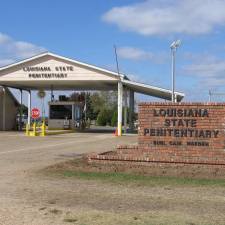
Photo courtesy Angola Prison / Wikipedia Commons
A controversial new plan to prepare inmates for reentry into society is being proposed in Louisiana. The idea is to move a thousand prisoners from a minimum-security prison in the state and transfer them to Angola Prison, a maximum-security prison once infamous for violence and decrepit conditions. There, the minimum-security prisoners would receive mentoring from their Angola counterparts. Four “mentees” would be assigned to a mentor, and would spend all waking hours together – attending vocational training, eating meals, and taking part in evening worship and Bible study. Upon completion, the prisoners from the minimum-security prison would be released.
As Professor John Rottman of Calvin Theological Seminary describes it, “The goal of these programs is moral rehabilitation, and the instrument of rehabilitation is the Gospel of Jesus.”
It doesn’t sound like a typical prison program. But Angola isn’t your typical maximum-security prison, and Burl Cain is not your standard prison warden.
Prior to his taking the position as warden in 1995, Angola had the reputation of being “the bloodiest prison in America.” The American Bar Association had referred to conditions in the prison as “medieval, squalid, and horrifying.” One report on Angola estimated that 25 percent of the prison population was in some sort of coercive sexual relationship.
Faced with a reduction in federal funding for in-prison programming, Warden Cain approached the New Orleans Baptist Seminary and asked if they would be willing to facilitate a Bible class at Angola. That Bible class eventually developed into a full-fledged seminary program, complete with study of Greek and Hebrew, as well as a Bachelor’s of Ministry program, graduating 40-50 inmates every year.
The changes brought about as a result of the introduction of this original Bible class are nothing short of amazing. Violent events have been reduced about 85 percent since the first Bible study. About 400 inmates now attend worship services every week, representing over 30 different “congregations.”
Other programs have also developed. A hospice program was established to care for dying inmates. (Most inmates in Angola are serving life sentences, and will ultimately die inside the prison walls.) The Returning Hearts program brings together inmates and their children once a year, mending relationships and serving as encouragement to father and child alike.
Too often, those of us on the outside of the prison walls think only of those going into prison (“I hope they get what the punishment they deserve”) or those coming out (“I hope they won’t reoffend”). We forget about the ongoing work of the Holy Spirit taking place in the prisons – both in the lives of those preparing to return, and in the lives of those who will never leave. We forget that God can use even the vilest offender to further His kingdom, and that redemption is available even to those forgotten to the outside world.
The book of Hebrews provides a listing of individuals who, by faith, served their Heavenly Father. Many of the names are familiar, while others are only referenced anonymously – forgotten to time, but known to God. The author lifts these individuals up as examples of faithfulness, saying that their faith is credited to them as righteousness.
But a closer look at the list reveals a rogues’ gallery. There is a thief (Jacob), an adulterer (David), a prostitute (Rahab), and two murderers (David again, Moses). Despite their flaws, God chose these men and women as his saints, proclaiming His Word and serving His people.
Those inmates serving God through mentoring their fellow inmates can be added to this list. In such a unlikely setting as a maximum-security prison, these men are creating disciples, and preparing those disciples to take the Gospel to a world most of the mentors will never again see.
Theological training and mentoring are a couple of the programs Prison Fellowship offers to inmates. To learn more about our Prisoners to Pastors program, click here. And to learn how you can be a part of mentoring prisoners preparing for reentry, visit our get involved page.